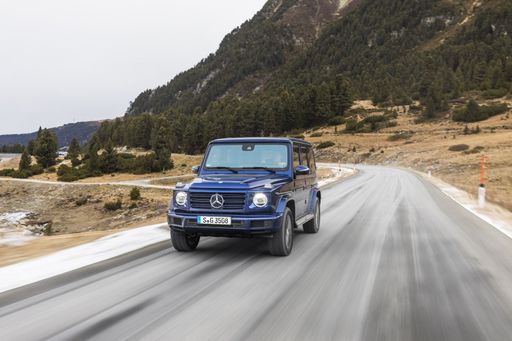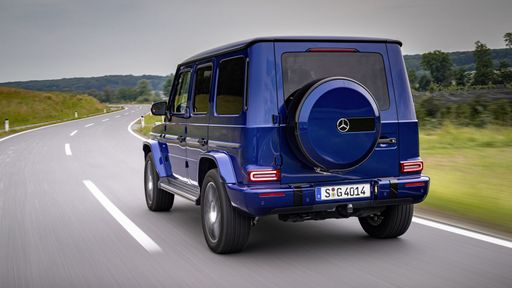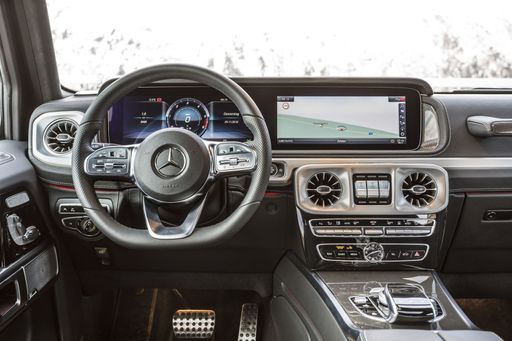Mercedes G Class VS VW Transporter Transporter – Specs, Efficiency & Price Comparison
Which model is the better choice – the Mercedes G Class or the VW Transporter Transporter? We compare performance (605 HP vs 286 HP), boot capacity (640 L vs ), efficiency (28 kWh8.70 L vs 21.90 kWh7.10 L), and of course, the price (106600 £ vs 37500 £).
Find out now which car fits your needs better!
The Mercedes G Class (Off-Roader) is powered by a Electric, Petrol MHEV or Diesel MHEV engine and comes with a Automatic transmission. In comparison, the VW Transporter Transporter (Cargo Van) features a Diesel, Plugin Hybrid or Electric engine and a Manuel or Automatic gearbox.
When it comes to boot capacity, the Mercedes G Class offers 640 L, while the VW Transporter Transporter provides – depending on what matters most to you. If you’re looking for more power, you’ll need to decide whether the 605 HP of the Mercedes G Class or the 286 HP of the VW Transporter Transporter suits your needs better.
There are also differences in efficiency: 28 kWh8.70 L vs 21.90 kWh7.10 L. In terms of price, the Mercedes G Class starts at 106600 £, while the VW Transporter Transporter is available from 37500 £.
Compare all the key specs now and find out which model fits your lifestyle best!
Mercedes G Class
The Mercedes-Benz G-Class stands as a symbol of rugged luxury, combining robust off-road capabilities with sophisticated design. Its iconic boxy shape and imposing presence are complemented by a lavish interior that offers a blend of comfort and cutting-edge technology. Despite its longstanding heritage, the G-Class continues to evolve, maintaining its status as a premier choice for those seeking both adventure and opulence.
details @ group-media.mercedes-benz.com
@ group-media.mercedes-benz.com
 @ group-media.mercedes-benz.com
@ group-media.mercedes-benz.com
 @ group-media.mercedes-benz.com
@ group-media.mercedes-benz.com
VW Transporter Transporter
The VW Transporter, a versatile favourite among commercial vehicles, combines practicality with modern design. Its spacious interior offers ample room for both passengers and cargo, making it a reliable choice for businesses and families alike. The vehicle's strong build and advanced technology ensure a smooth and efficient driving experience in various conditions.
details

|
|
|
|
|
Costs and Consumption |
|
|---|---|
|
Price
106600 - 171000 £
|
Price
37500 - 60800 £
|
|
Consumption L/100km
8.7 - 14.7 L
|
Consumption L/100km
7.1 - 8.4 L
|
|
Consumption kWh/100km
28 kWh
|
Consumption kWh/100km
21.9 - 24.4 kWh
|
|
Electric Range
468 km
|
Electric Range
56 - 331 km
|
|
Battery Capacity
116 kWh
|
Battery Capacity
11.8 - 63.8 kWh
|
|
co2
0 - 336 g/km
|
co2
0 - 220 g/km
|
|
Fuel tank capacity
100 L
|
Fuel tank capacity
55 L
|
Dimensions and Body |
|
|---|---|
|
Body Type
Off-Roader
|
Body Type
Cargo Van
|
|
Seats
5
|
Seats
2 - 5
|
|
Doors
5
|
Doors
4 - 5
|
|
Curb weight
2485 - 3085 kg
|
Curb weight
1872 - 2462 kg
|
|
Trunk capacity
620 - 640 L
|
Trunk capacity
-
|
|
Length
4624 - 4873 mm
|
Length
5050 - 5450 mm
|
|
Width
1931 - 1984 mm
|
Width
2032 mm
|
|
Height
1973 - 1983 mm
|
Height
1966 - 1985 mm
|
|
Payload
415 - 715 kg
|
Payload
755 - 1259 kg
|
Engine and Performance |
|
|---|---|
|
Engine Type
Electric, Petrol MHEV, Diesel MHEV
|
Engine Type
Diesel, Plugin Hybrid, Electric
|
|
Transmission
Automatic
|
Transmission
Manuel, Automatic
|
|
Transmission Detail
Automatikgetriebe
|
Transmission Detail
Manual Gearbox, Automatic Gearbox
|
|
Drive Type
All-Wheel Drive
|
Drive Type
Front-Wheel Drive, All-Wheel Drive, Rear-Wheel Drive
|
|
Power HP
387 - 605 HP
|
Power HP
110 - 286 HP
|
|
Acceleration 0-100km/h
4.4 - 5.8 s
|
Acceleration 0-100km/h
7.4 - 16.9 s
|
|
Max Speed
180 - 220 km/h
|
Max Speed
112 - 150 km/h
|
|
Torque
760 - 1164 Nm
|
Torque
310 - 415 Nm
|
|
Number of Cylinders
6 - 8
|
Number of Cylinders
4
|
|
Power kW
285 - 445 kW
|
Power kW
81 - 210 kW
|
|
Engine capacity
2989 - 3982 cm3
|
Engine capacity
1996 - 2488 cm3
|
General |
|
|---|---|
|
Model Year
2024 - 2025
|
Model Year
2025
|
|
CO2 Efficiency Class
A, G
|
CO2 Efficiency Class
G, A
|
|
Brand
Mercedes-Benz
|
Brand
VW
|
Mercedes G Class
Reimagining the Icon: A Deep Dive into the Mercedes-Benz G-Class
Long regarded as the epitome of luxury in the off-road vehicle segment, the Mercedes-Benz G-Class continues to capture the imagination of car enthusiasts with its perfect blend of heritage, capability, and modern innovation. As the G-Class evolves, it continues to captivate with its sophisticated technology and uncompromised performance.
Timeless Design with Modern Innovations
The Mercedes-Benz G-Class may have a classic boxy silhouette that dates back to its origins, but beneath its exterior lies a treasure trove of modern technology. The design updates include an array of LED lights and aerodynamically optimized components that seamlessly integrate its rugged ethos with a contemporary finish. This aesthetic appeal is complemented by its remarkable interior, which features state-of-the-art technologies and luxurious materials.
Powertrain Performance and Options
The G-Class offers a variety of powertrain configurations, each of which is crafted to deliver awe-inspiring performance. With engine options ranging from diesel mild-hybrids, like the impressive 387 PS model, to fully electric variations boasting up to 588 PS, versatility is a key component of the G-Class DNA. These engines are paired with an advanced 9-speed automatic transmission, ensuring a smooth and controlled ride across all terrains.
Unmatched Driving Dynamics and Off-road Capability
Famed for its off-road prowess, the G-Class remains a formidable force on and off the tarmac. The iconic off-roader comes with a range of driving modes and features, including a sophisticated all-wheel-drive system. Drivers benefit from technologies such as advanced traction control and adaptive damping, which adjust to the terrain, enhancing the vehicle's off-road capabilities while maintaining luxury-grade comfort.
Safety and Technology at the Core
The G-Class is equipped with Mercedes-Benz's suite of safety technologies, offering peace of mind no matter the journey. Features such as adaptive cruise control, lane-keeping assistance, and active brake assist illustrate Mercedes-Benz's commitment to safety. Furthermore, the infotainment system marries cutting-edge connectivity with an intuitive user interface, providing both driver and passengers with an elevated driving experience.
Efficiency and Practicality
Despite its imposing stature, the G-Class offers an efficient performance profile, with CO2 efficiency ratings starting from A. The intelligent hybrid systems employed in both petrol and diesel models significantly enhance fuel efficiency, with consumption figures ranging from 8.7 to 14.7 L/100km, and electric vehicles offering an impressive range of up to 468 km.
The Premium Off-road Luxury Experience
Mercedes-Benz has undeniably preserved the essence of the G-Class while infusing it with innovations that cater to modern demands. From its robust powertrains to its exceptional craftsmanship and technology, the G-Class stands as a testament to Mercedes-Benz's prowess in the luxury off-road market.
For those yearning for a blend of luxury, performance, and adventure, the G-Class remains an unmatched option—proving that some legends only get better with time.
VW Transporter Transporter
Revolutionizing Utility: The VW Transporter T7
The latest iteration of the VW Transporter, known widely as the Transporter T7, marks a significant evolution in utility vehicle design and functionality. As a mainstay in the VW lineup, the Transporter T7 comes with a plethora of options, ensuring that it meets a variety of professional and personal needs.
Diverse Models to Fit Every Need
For 2025, the VW Transporter T7 is available in multiple configurations, ranging from efficient diesel engines to innovative hybrid systems. The conventional models are powered by a 2.0 TDI diesel engine, offering three power outputs: 110 HP, 150 HP, and a vigorous 204 HP. For those seeking a more sustainable option, the 2.5 eHybrid model provides a combined power output of 233 HP with an electric range of 56 km, thanks to its 11.8 kWh battery.
Innovative Technical Aspects
Underpinning the technical innovations of the Transporter T7 is VW's dedication to cutting-edge engineering. The diesel engines provide torque ranging from 310 Nm up to 390 Nm, ensuring robust performance across the lineup. Moreover, the T7 offers configurations with either manual or automatic gearboxes, catering to different driving preferences.
The availability of front-wheel drive and the 4MOTION all-wheel-drive system across the range enhances versatility, allowing the Transporter T7 to tackle various terrains with ease. With body lengths extending to 5450 mm and a payload capacity of up to 1259 kg, the Transporter T7 stands as a paragon of practicality for transporting goods or accommodating passengers.
Comfort and Design Revolution
Beyond performance, the VW Transporter T7 has been designed with driver comfort and ergonomic efficiency in mind. The cabins offer ample seating configurations, supporting both two-seat and five-seat layouts. The inclusion of modern conveniences elevates the driving experience, making long hauls more manageable and stress-free.
The exterior dimensions, with a width of 2032 mm and a height up to 1969 mm, marry the classic robust design with a contemporary touch, making the Transporter T7 a visual centerpiece in any fleet.
Economical and Environmental Impact
Economic efficiency is another critical aspect of the VW Transporter T7's design philosophy. With diesel fuel tank capacities between 55 and 63 liters, and an emphasis on improving mileage with each engine variant, operational costs are kept at a minimum. Additionally, the eHybrid model not only offers environmental benefits but also presents substantial savings on fuel through its electric range capability.
Conclusion: The Transporter T7 Legacy Continues
The VW Transporter T7 furthers the legacy of its predecessors by combining practicality, innovation, and eco-friendliness. Whether utilized for business in its cargo van capacity or adapted for personal use with seating comforts, the Transporter T7 is set to remain a critical player in the automotive sector, pushing the boundaries of what a multi-purpose van can achieve.
The prices and data displayed are estimates based on German list prices and may vary by country. This information is not legally binding.
